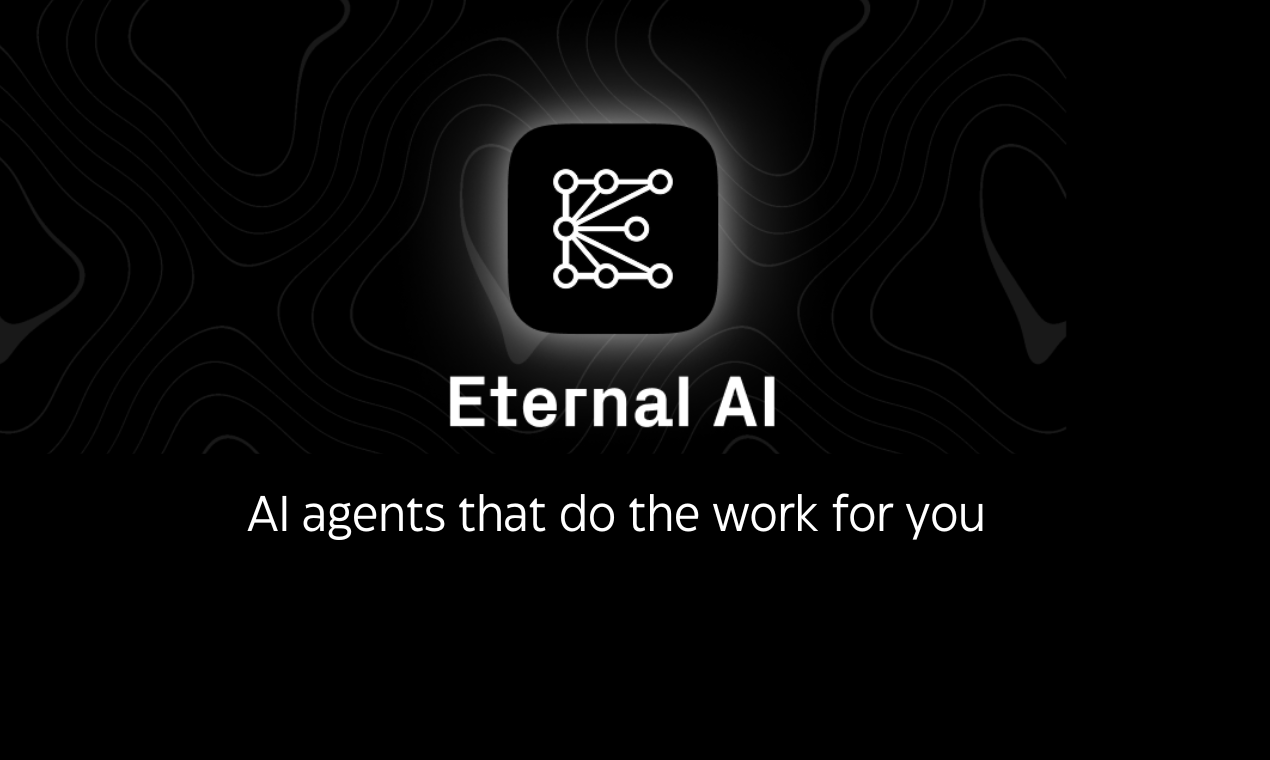
Table of Contents
Overview
In the evolving landscape of decentralized artificial intelligence, a new platform is emerging that combines blockchain technology with AI agent capabilities. Eternal AI is an innovative blockchain-based platform designed to provide AI agents through decentralized infrastructure. This platform offers AI capabilities for various tasks including code generation, image creation, and website development, while leveraging blockchain technology for enhanced transparency and user control. The platform represents a technical approach to democratizing AI access through decentralized networks.
Key Features
Eternal AI distinguishes itself through its blockchain-integrated architecture and specialized AI agent offerings.
- Blockchain-Integrated AI Agents: Deploy AI models as smart contracts on multiple blockchains, providing verifiable and transparent AI interactions through decentralized infrastructure.
- Multi-Chain Compatibility: Support for deployment across various blockchain networks including Bitcoin, Ethereum, and Solana, offering flexibility in implementation approaches.
- Decentralized Infrastructure: Utilize distributed computing resources for AI inference, reducing dependency on centralized service providers.
- Developer-Focused Tools: Access comprehensive APIs and development frameworks designed for building AI-powered decentralized applications.
- Programmable AI Interactions: Create customizable AI agents with specific parameters and behaviors defined through smart contract logic.
How It Works
Eternal AI operates through a technical framework that requires blockchain knowledge and development expertise. Users begin by establishing API credentials and configuring blockchain connectivity through the platform’s development environment. The process involves deploying AI models as smart contracts on supported blockchain networks, which requires technical understanding of both AI and blockchain technologies. Subsequently, users can interact with deployed agents through API calls while leveraging the decentralized infrastructure for AI inference and computation.
Use Cases
Eternal AI addresses specific technical scenarios where blockchain-integrated AI provides distinct advantages for developers and organizations.
- Decentralized Application Development: Build AI-powered dApps that maintain transparency and verifiability through on-chain AI interactions, suitable for applications requiring auditable AI decisions.
- Blockchain-Native AI Services: Create AI services that operate entirely within blockchain ecosystems, offering censorship resistance and transparent operation for specialized use cases.
- Developer Infrastructure Projects: Implement AI capabilities in blockchain applications where traditional centralized AI services may not align with decentralization principles.
- Research and Experimentation: Explore the intersection of AI and blockchain technologies for academic or commercial research purposes requiring verifiable AI outputs.
Pros \& Cons
Advantages
- Technical Innovation: Pioneering the integration of AI models with blockchain smart contracts, offering unique transparency and verifiability features.
- Decentralized Architecture: Reduced dependency on centralized AI service providers through distributed infrastructure implementation.
- Developer Control: Enhanced control over AI model deployment and operation through programmable smart contract interfaces.
Disadvantages
- Technical Complexity: Requires significant blockchain and AI development expertise, making it inaccessible to non-technical users.
- Setup Requirements: Involves complex configuration processes including API key management and blockchain network setup.
- Limited Accessibility: Not designed for general consumer use, targeting primarily developers and technical organizations.
How Does It Compare?
When evaluating Eternal AI against other AI platforms, its specialized positioning in the blockchain-AI intersection becomes apparent. OpenAI’s ChatGPT and Anthropic’s Claude operate as centralized services with comprehensive safety measures and user-friendly interfaces, making them suitable for general consumer and business applications. Grok (xAI) experienced significant content moderation challenges in 2025, leading to increased restrictions and regulatory scrutiny across multiple jurisdictions.
In the uncensored AI space, platforms like CrushOn.AI and Venice AI provide specialized services for unrestricted interactions, while Dolphin 3 and Hermes 3 offer open-source alternatives for self-hosting. These platforms focus primarily on user experience and accessibility rather than blockchain integration.
Eternal AI differentiates itself through its technical focus on blockchain infrastructure rather than user accessibility. While established AI platforms prioritize ease of use and broad applicability, Eternal AI targets developers seeking verifiable, decentralized AI capabilities. The optimal choice depends on technical requirements, development expertise, and the specific need for blockchain-integrated AI functionality.
Final Thoughts
Eternal AI represents a specialized approach to AI deployment through blockchain technology, addressing the technical needs of developers working at the intersection of artificial intelligence and decentralized systems. Its emphasis on smart contract integration and multi-chain compatibility provides unique capabilities for specific use cases requiring verifiable AI interactions. While considerations include technical complexity and limited general accessibility, its blockchain-native approach offers distinctive value for projects prioritizing decentralization and transparency. The platform’s continued development will likely depend on expanding its developer ecosystem and simplifying implementation processes while maintaining its core technical advantages.

